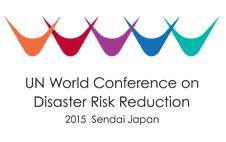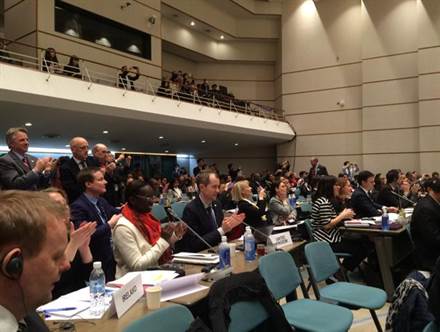
From WCDRR Sendai: Eco-DRR Report – Thursday 19 March
-
Climate and disaster risks
-
Coastal resilience
-
Community resilience
-
Integrated delta management
The Sendai Framework on Disaster Risk Reduction 2015-2030 has been agreed at 10pm in Japan with a central role for ecosystem degradation as a root cause of increased risk and for ecosystem based approaches as key solutions for reduced risk; overview of statements from global leaders and practitioners in Sendai pointing to the important role environment and healthy ecosystems can play in reducing disaster risk.

Providing daily news, blogs and updates on ecosystem solutions for reducing disaster risk at the World Conference on DRR, 14-18 March in Sendai, Japan. Our experts in Sendai are available for background and interviews. CONTACT: [email protected] and [email protected]. Phone: +31622624702. Follow us on Twitter @wetlandsint
What happened on the final days in Sendai:
Sendai Framework for Disaster Risk Reduction 2015-2030 adopted!

After 5 days of intense meetings and marathon sessions at the WCDRR in Sendai, Parties adopted the Sendai Framework for Disaster Risk Reduction 2015-2030.
Overall, Wetlands International is positive about the Sendai Framework. The new agreement concluded with lots of focus on disaster risk prevention and addressing the underlying causes of risk including environmental degradation.
Marie-Jose Vervest, Programme Head Community Resilience: “Environment has received unprecedented attention and is now present across the document. There is reference to ecosystems at multiple locations in the text. In particular there is attention in the agreement for the inclusion of ecosystems in risk analysis and planning and there are various references to the importance of building environmental resilience. The call is also being made to countries to strengthen the sustainable use and management of ecosystems and for cooperation between countries in this. We would have liked to see even stronger recognition of ecosystem recovery and better management as an integral part of the solution in DRR strategies. In addition there is too little attention to the specific importance of better water management and the role of wetlands in the specific agreement.”
Plenary statement of 17 March Radhika Murti from IUCN calling for incentives for nature based solutions to DRR in the new framework for Disaster Risk Reduction:
Countries turn to Ecosystems to Reduce Disaster Risk
Throughout the World Conference on Disaster Risk Reduction in Sendai, global leaders and practitioners have been pointing to the important role environment and healthy ecosystems can play in reducing disaster risk in plenary presentation and during events. Wetlands International and PEDRR partners put out a press release with an overview of some of the quotes that we heard coming by in Sendai on this topic. Considering this mounting interest in ‘nature- or ecosystem-based solutions’ to DRR and climate change adaptation, PEDRR members strongly urges for the scaling up of ecosystems based DRR in policy and practice.
New resources on Eco-DRR
- BLOG: Recipe for Resilience – Ecosystem and climate Smart Disaster Risk Reduction, by Julio Montes de Oca Lugo, Wetlands International Panam
- BLOG: Investment in natural capital for risk reduction, an opportunity not a cost, by Ritesh Kumar, Wetlands International South Asia
